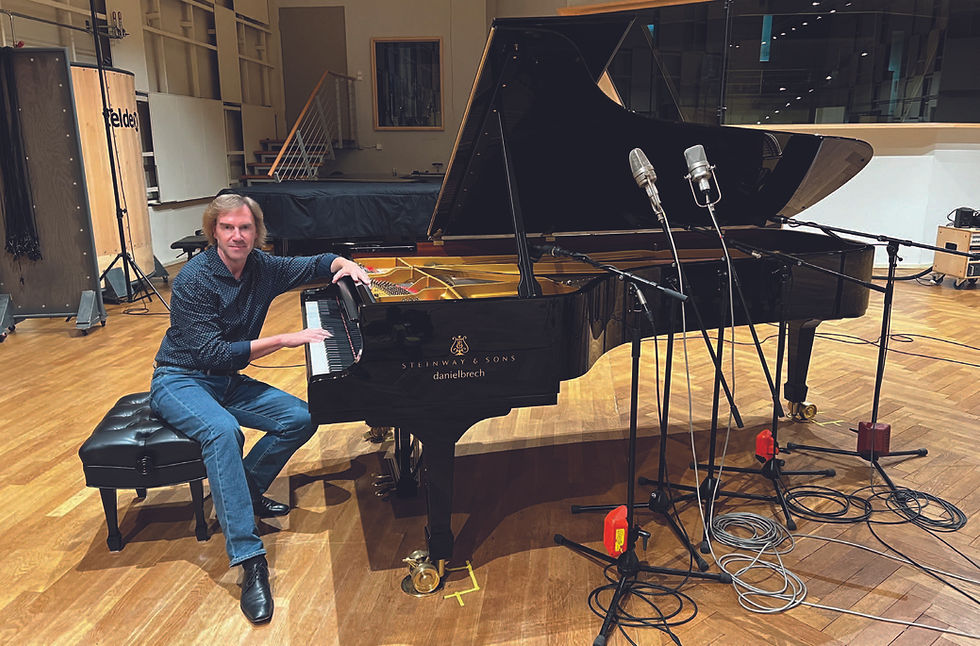Faculty News: Robert Schumann’s Poetics
- Wein Wei
- Mar 6, 2024
- 4 min read
Colin Clarke lauds a new three-disc set embodying mystical fusions and ecstasies from the pianist Burkard Schliessmann
Received wisdom is anathema to Burkard Schliessmann. Here, on his most recent release, ‘Fantasies’, he explores Schumann’s unique internal landscape, piling interpretative revelation upon revelation in the process. Here is a pianist in the lineage of the great Romantics: he has worked with Shura Cherkassky, Bruno Leonardo Gelber and Poldi Mildner (a pupil of Rachmaninov and Schnabel); he appears as torch-bearer of that tradition, fine instincts couched within a deep musical intellect and captured via the finest available recording techniques; a studio audience recreates the ambience of live performance.
For this remarkable project on Divine Art Records, a remarkable instrument was required: a Steinway (D-612236), provided by Daniel Brech and equipped with two keyboards complete with mechanics and hammers (one bright, one dark). The recording process, too, is state-of-the-art: recording producer Julian Schwenkner, alongside recording engineer Jupp Wegner, worked at Teldex Studio in Berlin with 14 microphones (including Coles 4038 and Royer R121 ribbon mics plus Neumann M49 tube mics) for a Dolby Atmos-compatible result. This generates the ideal sonic experience, the truest replication of Schliessmann’s rich sound. There is just a crystal-clear link between player and composer.
The approach here is that of an exposition and exploration of phantasmagoria: the aspect of Schumann’s output that speaks to the realms of illusion, and of its relation to reality. Schliessmann sees this particularly reflected in ideas of twilight, referencing Liederkreis (Op 24 No 3, specifically), and how illusion is – magically – created there. ‘Schumann’s piano output cannot be considered from an isolated point, let alone understood; rather, it is a reflection of his song compositions,’ says Schliessmann.

Burkard Schliessmann recorded his three-disc Schumann set in the wonderful acoustic of the Teldex Studios in Berlin
Revealing Schumann’s penchant for the liminal, then, is foundational here: and nowhere is this more evident than in the late and woefully under-appreciated Gesänge der Frühe (‘Songs of the morning’) that close the set, the last work Schumann himself prepared for publication. Elusive yet magnificent, Schliessmann persuades us, rightly, that this is truly great music.
Schliessmann has a 360-degree approach to Schumann. When the composer writes ‘Innig’, that’s exactly what Schliessmann delivers; he whispers into the listener’s ear. By the same token, the extreme virtuosity of some of the writing (in the Fantasie, most famously, the coda of the second movement) poses no obstacle. Like the greats of Schumann interpretation before him – Yves Nat, Claudio Arrau, Edwin Fischer – Schliessmann has each and every tool required for this mystical journey into Schumann’s soul. The final movement of Kreisleriana is a masterclass: the sustaining of the bass, the crisp right hand, all creating the perfect Schumann ambience.
When it comes to the Fantasie, this is hardly Schliessmann’s first rodeo. Years of complete immersion in this score reveal myriad details in an interpretation that never loses sight of its end goals. The key element here is pedalling, and Schliessmann lets no detail go unnoticed without the slightest touch of blurring. A core of steel runs through the first movement; few, if any performances, capture the spirit of a march so perfectly as Schliessmann in the second movement, the music’s inexorable sweep undeniable. Arguably, though, the jewel in this Fantasie’s crown is the finale: a phantasmagorical exploration of psychic states such as few have dared.

left to right: Daniel Brech (Steinway & Sons), Burkard Schliessmann and Julian Schwenkner
The Arabeske is far more than a palette-cleanser. Ruminative yet light, it acts more as a prolongation of the immense expanses of the Fantasie, as illuminating a re-interpretation as one can find. The close takes us to hitherto unimagined spheres.
Schumann’s first collection, the Fantasiestücke, Op 12, contains one of two pieces to appear twice in Schliessmann’s collection: the first of Op 12, ‘Des Abends’, appears slightly freer in isolation; a second Arabeske flows like a stream. The alternatives remind us of the validity of subtly different approaches, that if we comprehend the inner machinations of this music, there can be equally valid voices. This performance of the Fantasiestücke contains gem after gem: the grandeur of ‘Aufschwung’, the nightmarish elements of ‘In der Nacht’. If the Fantasie, as Schliessmann suggests, links to Wagner’s Tristan, one can find perhaps an echo here in the perfumed harmonies that open ‘Fabel’.
The journey, from the first disc’s kaleidoscopic Kreisleriana to the later works on the final disc, is awe-inspiring. That final disc is a treasure-trove of lesser-known yet deserving Schumann. As well as the Gesänge der Frühe, the Nachtstücke of 1839 exude mysteries that surely speak of later Schumann; even the active third movement (‘Mit grosser Lebhaftigkeit’) speaks of issues profound. Schliessmann treats Schumann’s later works with deepest respect; they are no oddities or the result of mental illness, but intensely personal statements in their own right. The later Fantasiestücke (Op 111) are impassioned: this is ardent playing, intensely involving, and Schliessmann pinpoints the darkness at the music’s centre.
Burkard Schliessmann’s invitation to encounter the core of Schumann presents performances that enrich the soul in a recording that is surely unparalleled.

Burkard Schliessmann’s three-disc Schumann album ‘Fantasies’ is available on Divine Art, DDC25753, from 15 March Burkard Schliessmann: schliessmann.com
Divine Art: divineartrecords.com Steinway & Sons: steinway.com/artists/burkard-schliessmann


